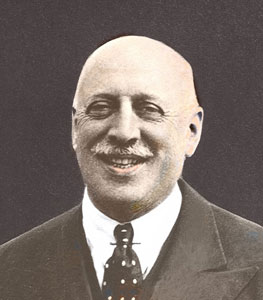An overview of Social Credit
Those who “surf” regularly on the internet know the website wikipedia.org, a free encyclopedia on almost any subject. As a matter of fact, if you search for the words “social credit”, you will get a very honest overview of what it is all about. Here is a recent version of this article:
Social Credit is a socio-economic philosophy wherein consumers, fully provided with adequate purchasing power, establish the policy of production through exercise of their monetary vote. In this view, the term economic democracy does not mean worker control of industry. Removing the policy of production from banking institutions, government, and industry, Social Credit envisages an “aristocracy of producers, serving and accredited by a democracy of consumers”. (C. H. Douglas, Credit-Power and Democracy.)
The term Social Credit, as a formal name, originated from the writings of British engineer and originator of the Social Credit movement, Clifford Hugh Douglas (1879-1952), who wrote a book by that name in 1924. According to Douglas, the true purpose of production is consumption, and production must serve the genuine, freely expressed interests of consumers. Each citizen is to have a beneficial, not direct, inheritance in the communal capital conferred by complete and dynamic access to the fruits of industry assured by the National Dividend and Compensated Price. Assuming the only safe place for power is in many hands, Social Credit is a distributive philosophy, and its policy is to disperse power to individuals. The Social Credit philosophy is best summed up by Douglas when he said, “Systems were made for man, and not man for systems, and the interest of man which is self-development, is above all systems, whether theological, political, or economic.” (Douglas, Economic Democracy.)
Social Credit Economic Policy
C. H. Douglas proposed that a rate of income less than prices generated during any production period results in deficiency in purchasing power. His A+B theorem states that if A is all wages, salaries, and dividends paid to consumers and B is the cost of overhead and depreciation not paid to consumers, then prices charged for all goods must be at least A+B. But since only A payments are received as income, then consumer purchasing power is typically less than prices generated during the same production period.
Douglas suggested that widespread unemployment, debt, poverty, and war are inevitable to sustain such a system. As automation progressively replaces human labour in production, Douglas believed Social Credit could ensure enough purchasing power for consumers to buy all goods produced along with ample leisure time. His Social Credit solution included three core components:
- A National Dividend to provide all citizens with a basic income guarantee, regardless of employment status.
- A Compensated Price (price adjustment mechanism) that reflects the real cost of production as the mean rate of consumption over the mean rate of production for an equivalent period of time.
- A National Credit Office to statistically calculate the amount of credit that should be circulating in the economy.
Economic theory
Douglas disagreed with classical economists such as Adam Smith and David Ricardo who divided the factors of production into land, labour, and capital. He also disagreed with Karl Marx who claimed that labour created all wealth. Douglas believed the “cultural inheritance of society” was the primary factor in production. Our cultural inheritance is defined as the knowledge, technique, and processes that have been handed down to us incrementally from the origins of civilization. Consequently, we do not have to keep “reinventing the wheel”. “We are merely the administrators of that cultural inheritance, and to that extent the cultural inheritance is the property of all of us, without exception.” (Douglas, The Monopolistic Idea.) Douglas also criticized classical economics because it was based upon a barter economy; whereas, the modern economy is a monetary one.
The Nature of Money and Credit
To the classical economist, money is a medium of exchange. This may have once been the case when the majority of wealth was produced by individuals who subsequently exchanged it with each other. But in modern economies, division of labour splits production into multiple processes, and wealth is produced by people working in association with each other. For instance, an automobile worker does not produce any wealth (i.e., the automobile) by himself, but only in conjunction with other auto workers, the producers of roads, gasoline, insurance, etc..
In this view, wealth is a pool upon which people can draw, and the efficiency gained by individuals cooperating in the productive process is known as the “unearned increment of association” – historic accumulations of which constitute what Douglas called the “cultural heritage”. The means of drawing upon this pool are the tickets distributed by the banking system.
Initially, money originated from the productive system, when cattle owners punched leather discs which represented a head of cattle. These discs could then be exchanged for corn, and the corn producers could then exchange the disc for a head of cattle at a later date. The word “pecuniary” comes from the Latin “pecus“, meaning “cattle”. Today, the productive system and the distributive/monetary system are two separate entities. Douglas demonstrated that loans create deposits, and presented mathematical proof in his book Social Credit. Bank credit comprises the vast majority of money, and is created every time a bank makes a loan. Douglas was also one of the first to understand the creditary nature of money. The word credit derives from the Latin “credere“, meaning “to believe”. “The essential quality of money, therefore, is that a man shall believe that he can get what he wants by the aid of it.” (Douglas, Warning Democracy.)
Money should not be regarded as a commodity but rather as a ticket, a means of distribution of production. “There are two sides to this question of a ticket representing something that we can call, if we like, a value. There is the ticket itself – the money which forms the thing we call ‘effective demand’ – and there is something we call a price opposite to it.” (Douglas, The Use of Money.) Money is effective demand, and the means of reclaiming that money are prices and taxes. As real capital replaces labour in the process of modernization, money should become increasingly an instrument of distribution.
Douglas also claimed the problem of production, or scarcity, had long been solved. The new problem was one of distribution. Douglas criticized the banking system on two counts: 1) for being a form of government which has been centralizing its power for centuries, and 2) for claiming ownership to the money they create. The latter he claimed was equivalent to claiming ownership of the nation. Money, Douglas claimed, was merely an abstract representation of the real credit of the community, which is the ability of the community to deliver goods and services, when and where they are required.
Political theory
C. H. Douglas defined democracy as the “will of the people”, not rule by the majority (Douglas, The Nature of Democracy), suggesting that Social Credit could be implemented by any political party supported by effective public demand. Once implemented to achieve a realistic integration of means and ends, party politics could cease to exist. Traditional ballot box democracy is incompatible with Social Credit, which assumes the right of individuals to choose freely one thing at a time, and to contract out of unsatisfactory associations. Douglas advocated what he called the “responsible vote”, where anonymity in the voting process would no longer exist. “The individual voter must be made individually responsible, not collectively taxable, for his vote.”
Opposing the formation of Social Credit Parties, C. H. Douglas believed a group of elected amateurs should never direct a group of competent experts in technical matters. While experts are ultimately responsible for achieving results, the goal of politicians should be to pressure those experts to deliver policy results desired by the populace. According to Douglas, “the proper function of Parliament is to force all activities of a public nature to be carried on so that the individuals who comprise the public may derive the maximum benefit from them. Once the idea is grasped, the criminal absurdity of the party system becomes evident.” (Douglas, The Tragedy of Human Effort.)
Social Credit Philosophy
Douglas described Social Credit as “a policy of a philosophy”, and warned against viewing it solely as a scheme for monetary reform. He coined this philosophy “practical Christianity” – the central issue of which is the Incarnation. Douglas believed there was a Canon which ran through the universe, and Jesus Christ was the Incarnation of this Canon. However, he also believed Christianity remained ineffective so long as it remained transcendental. Religion, which derives from the Latin word “relegare” (to “bind back”), was intended to be a binding back to reality.
Social Credit is concerned with the incarnation of Christian principles in our organic affairs. Specifically, it is concerned with the principles of association and how to maximize the increments of association which redound to satisfaction of the individual in society – while minimizing any decrements of association. Social Credit elevates the importance of the individual and holds that all institutions exist to serve the individual – that the State exists to serve its citizens, not that individuals exist to serve the State.
The goal of Social Credit is to maximize immanent sovereignty. Social Credit is consonant with the Christian doctrine of Salvation through unearned Grace, and is therefore incompatible with any variant of the doctrine of salvation through works. Works need not have Purity of intent or desirable consequence and in themselves alone be as “filthy rags”. For instance, the present system makes destructive, obscenely wasteful wars a virtual certainty – which provides lots of “work” for everyone. Social Credit has been called the Third Alternative to the futile Left–Right Duality.
Although Douglas defined Social Credit as a philosophy with Christian roots, he did not envision a Christian theocracy. Practical Christian society is trinitarian in structure, based upon a constitution where the constitution is an organism changing in relation to our knowledge of the nature of the universe. Social Credit society recognizes the fact that the relationship between man and God is unique.
In this view, it is essential to allow man the greatest possible freedom in order to pursue this relationship. If people are given the economic security and leisure achievable in the context of a Social Credit dispensation, most would end their service to mammon and use their free time pursuing spiritual, intellectual, or cultural goals leading to self-development.
Douglas said that Social Crediters want to build a new civilization based upon absolute economic security for the individual – where “… they shall sit every man [individual] under his [her] vine and under his [her] fig tree; and none shall make them afraid.” In keeping with this goal, Douglas was opposed to all forms of taxation on real property. This set Social Credit at variance from the land-taxing recommendations of Henry George.
Douglas opposed what he termed “the pyramid of power”. Totalitarianism reflects this pyramid and is the antithesis of Social Credit. It turns the government into an end instead of a means, and the individual into a means instead of an end – “Demon est deus inversus” – “the devil is God upside down”. Social Credit is designed to give the individual the maximum freedom allowable given the need for association in economic, political, and social matters. “The progress of human society is best measured by the extent of its creative ability. Imbued with a number of natural gifts, notably reason, memory, understanding, and free will, man has learned gradually to master the secrets of nature, and to build for himself a world wherein lie the potentialities of peace, security, liberty, and abundance.”
Social Credit rejects dialectical materialistic philosophy. Douglas divided philosophy into two schools of thought that he labeled the “classical school”, and the “modern school”, which are broadly represented by philosophies of Aristotle and Francis Bacon respectively. Douglas was critical of both schools of thought, but believed that “the truth lies in appreciation of the fact that neither conception is useful without the other”.
https://www.michaeljournal.org/articles/social-credit/item/an-overview-of-social-credit
Further resources:
Major C.H. Douglas on “The Causes of War” – part 1
Major C.H. Douglas on “The Causes of War” – part 2
The Clifford Hugh Douglas Institute
The Australian League of Rights
 https://cultivateelevate.com/antioxidant-trio-6mix-dragons-blood-pearl-powder/?ref=2bfG3v4vqhqnIp
https://cultivateelevate.com/antioxidant-trio-6mix-dragons-blood-pearl-powder/?ref=2bfG3v4vqhqnIp
















